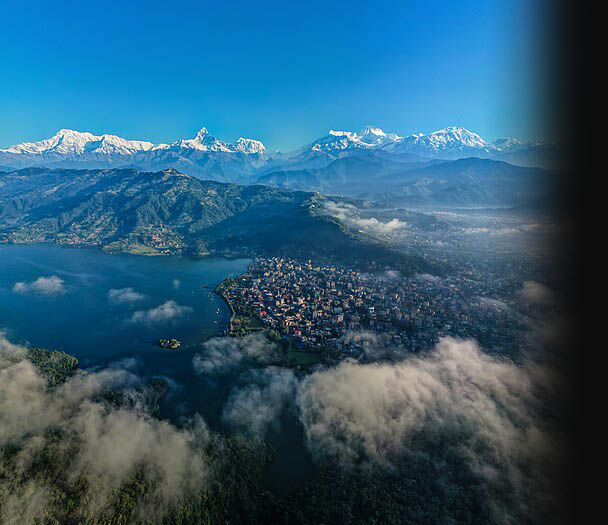
AROUND THE WORLD IN 80 WAYS
A WORLD OF IMPROVISATION
POKHARA, NEPAL
An inspired Nepalese improviser

AROUND THE WORLD IN 80 WAYS
Pokhara, Nepal
Improvisation at the top of the world
It was way back in 2018 that a random message appeared in my inbox on social media. “Hello, Shawn. It is good to meet you here…”
After the customary profile check, I realized that the fingers typing this surprise message to me were based in NEPAL and owned by one of the most enthusiastic Improvisation explorers I’ve come across in years, Bhupendra Dhakal.
Based in Pokhara, Nepal, Bhupendra seemed to be making introductions to MANY improvisers in the community. More than one improviser has contacted me asking if I know Bhupendra. Since his introduction to me in 2018, I think a lot more people are aware of him.
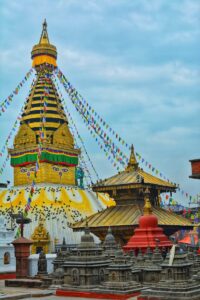 Like many of you, I had never heard of Pokhara. I even tried to send Bhupendra a copy of Keith Johnstone’s Impro ideas, “Impro for Storytellers“, but it appears that even the postal service couldn’t find our friend in Nepal. I think the book must be sitting somewhere on a mountain staring over the beautiful city.
Like many of you, I had never heard of Pokhara. I even tried to send Bhupendra a copy of Keith Johnstone’s Impro ideas, “Impro for Storytellers“, but it appears that even the postal service couldn’t find our friend in Nepal. I think the book must be sitting somewhere on a mountain staring over the beautiful city.
Many of us are aware of Nepal’s capital, Kathmandu. But at half the population of Kathmandu, (1.2 million) Pokhara (599,000) boasts a calm energy surrounded by 9 lakes and a crazy ride up a speedy Gondola to the 10th tallest mountain in the world – Annapurna. For those brave enough, you can ZIP down the steepest zip line almost 2 kilometres from top to bottom.
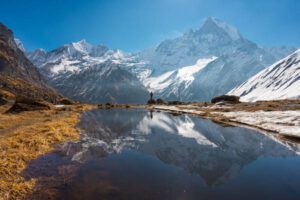 I looked around the web world for some images from Pokhara and I admit that the most impressive mountain view was a sharp peaked wonder called Machapuchare – (Also known as Fish Tail mountain) about 25 Km from town. This mountain has officially never been fully climbed because the government will not issue permits. It is considered home to the god Shiva and a sacred peak for the Gurung people and the people of Chomrong.
I looked around the web world for some images from Pokhara and I admit that the most impressive mountain view was a sharp peaked wonder called Machapuchare – (Also known as Fish Tail mountain) about 25 Km from town. This mountain has officially never been fully climbed because the government will not issue permits. It is considered home to the god Shiva and a sacred peak for the Gurung people and the people of Chomrong.
So much of Pokhara exudes the country’s mystique and I thought I needed to learn more about our Nepalese Improvisation cousins. I asked Bhupendra to tell me a bit about his journey and the community of Pokhara. Here is what he said.
Hi Bhupendra! Tell us a little bit about yourself:
Many times, I find myself as someone who derives immense joy from the realms of performance, storytelling, and the collective experience of live theatre. I readily define myself as a theatre practitioner and an avid scholar, deeply committed to exploring and expanding my understanding of the diverse art forms that enrich our world.
And how did theatrical Improvisation enter your world?
Exactly six years prior, I saw on the Internet that Mt. Olymprov (Greece) had opened an application call for instructors. The timing and my amateur experience in theatre motivated me to apply for the instructor position at the festival. A month later, I received an email from the festival informing me that I was not selected.Nevertheless, I continued to follow the festival website and Facebook page with curiosity about future instructor announcements. My journey into improvisation truly commenced as I began following the journeys of the selected instructors from Mt. Olymprov on various social media platforms.
Shortly thereafter, through connections and conversations with several of them, I gleaned insights into the world of improvisation, fueling my flowering enthusiasm to engage in Improv-related pursuits.”
What about Improvisation in Nepal’s culture?
My research on the Internet made me realize that we Nepalese have practiced improvisation since time immemorial.
Nepalese culture has a rich and multifaceted history deeply rooted in the country’s diverse cultural, ethnic, and artistic traditions. Traditional Nepalese theatre, such as Dohori (a form of musical debate), involves the spontaneous creation of lyrics and dialogues, paralleling the essence of improvisational theatre.
The comedic and satirical performances, where actors improvise to engage with the audience and address social issues through humor, closely align with the principles of Improv theatre.
Chants, dances, and healing practices spontaneously generated by shamans or “Jhankris” in various ethnic communities are examples of traditional improvisation practices. All these practices made me realize that improvisation in Nepalese culture could be a vibrant part of its artistic and social fabric.
How have you been developing your Improvisation community?
Despite unknowingly practicing it, I feel it can have a greater impact and bring about social changes if we practice it more professionally. Initially, I tried my best to explore it by networking virtually with experts or those who have a long background in improvisational theatre.
The global community of improvisation created in the digital world assisted me in connecting with like-minded people. I must mention Rahel Otsa from Estonia, Laurette Paix from New Caledonia, and Gary Schwartz from the USA, who heartily accepted my invitation to travel to Pokhara, Nepal, to sow the seeds of improv in the curious young minds through various workshops on improvisation. Gael Doorneweerd-Perry and Laura Doorneweerd-Perry from the Netherlands are other improvisers who helped foster growth after the curious young people had germinated.
A handful of itinerant improvisers graced us briefly with their presence, infusing our space with the fragrance and elegance of their craft. The insights I gathered from these gifted souls inspired me to weave something truly extraordinary, fostering and enriching the vibrant culture of Improv in Nepal.
And how did the idea for your improvisation festival grow?
I drew a rough sketch in my mind to organize an Improv festival three years ago. The time following the conception of this idea was a communicative phase with improvisers and Improv troupes from around the world, aimed at turning the rough sketch into a visible picture.
My vision became clearer after conversing with them, and I realized that organizing an Improv festival can bring numerous benefits to a community, fostering creativity, enhancing cultural exchange, and providing both education and entertainment. I believe that the workshops and master classes conducted at the festival can help local artists and enthusiastic learners to acquire new techniques and improve their skills.
Pokhara is a jewel of serenity and adventure. Cradled in the embrace of the majestic Himalayas, Pokhara unfolds as a radiant gem among the world’s cities, enchanting visitors with its natural splendor, tranquil lakes, and rich cultural mosaic. I hope a well-publicized festival can enhance the cultural profile of the host city, attracting future tourism and investment. With these promising prospects in mind, I joyously designated the dates for our grand festival, which took place from April 1 to April 12, 2024.
New festivals – especially in areas less explored – can struggle to come into existence. What were some of the challenges you faced?
Some potential difficulties and considerations I faced in organizing the festival included financial constraints (funding, sponsorship, and grants). As the first festival of its kind in Nepal, it was challenging to approach and persuade individual sponsors and companies, ensuring clarity on the agenda and how they would benefit from participating.
Securing governmental funds for organizing festivals becomes a daunting task without robust connections to both political authorities and the local community—an obstacle I currently face.
Guardians frequently underestimate the possibilities of a career in acting and improvisation. Consequently, parents are hesitant to nurture their children’s interest in the performing arts, making it difficult to draw participants to workshops.
In Nepal, registrations typically flood in at the last minute, a trend mirrored in the festival I organized. Despite my endeavors, only around 30 participants joined the workshop, both locally and internationally.
Completing the 12-day festival for the first time not only marked a milestone but also served as a learning experience, unveiling strategies to overcome challenges. Among these strategies were early planning, networking, community engagement, and the crucial skills of flexibility and adaptability.
And what does the future hold for your hopes?
I hold a grand ambition to establish infrastructure for an Art Quarter, alongside inaugurating it as Nepal’s first improvisational academy. By the end of 2026 my aspiration is to organize the second edition of Nepalaya Improvfest
Thanks Bhupendra,
Along with REACT IMPRO workshop group, we have offered Bhupendra a scholarship to come to Europe for a ten day workshop and networking opportunity in 2025 to further his Improvisation passions.
The mountains might be tall but the world is small. We are improvisers working with ideas that touch us all in deep and universal ways.
I would encourage all of you to consider a journey to the mountains of Pokhara, Nepal. Stop by and say, Namaste to Bhupendra. Share your views while you enjoy the sites, the food and the friendships you are likely to form.
I look forward to watching this community develop and playing with them as they explore where they will go next.
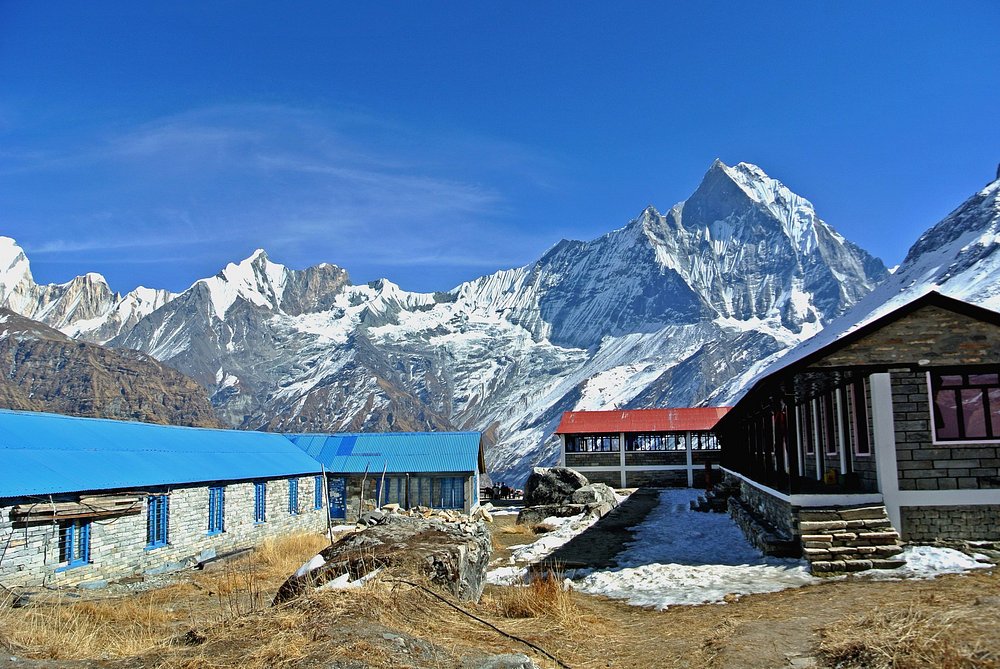
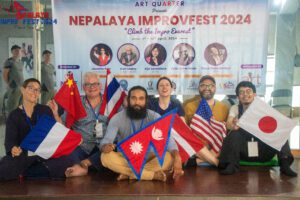 I drew a rough sketch in my mind to organize an Improv festival three years ago. The time following the conception of this idea was a communicative phase with improvisers and Improv troupes from around the world, aimed at turning the rough sketch into a visible picture.
I drew a rough sketch in my mind to organize an Improv festival three years ago. The time following the conception of this idea was a communicative phase with improvisers and Improv troupes from around the world, aimed at turning the rough sketch into a visible picture. 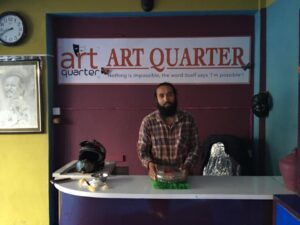



0 Comments